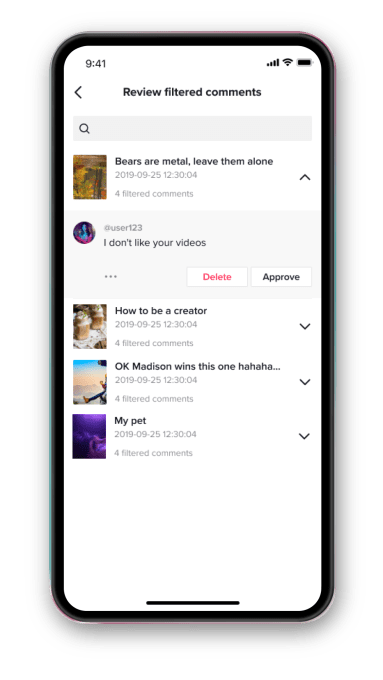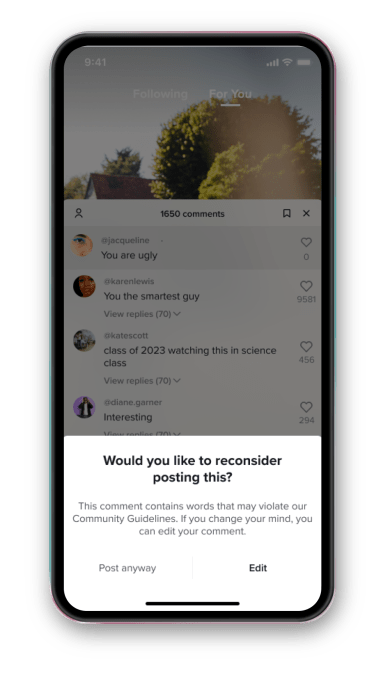Social Media
TikTok rolls out new commenting features aimed at preventing bullying

On the heels of last week’s launch of a new Q&A format for creators responding to viewer questions, TikTok today announced it’s rolling out new commenting features. Creators will now be able to control which comments can be posted on their content, before those comments go live. Another new addition, aimed at users who are commenting, will pop up a box that prompts the user to reconsider posting a comment that may be inappropriate or unkind.
TikTok says the goal with the new features is to maintain a supportive, positive environment where people can focus on being creative and finding community.

Image Credits: TikTok
Instead of reactively removing offensive comments, creators who choose to use the new “Filter All Comments” feature will instead get to choose which comments appear on their videos. When enabled, they’ll need to go through each comment individually to approve them using a new comment management tool.
This feature builds on TikTok’s existing comment controls, which allow creators to filter spam and other offensive comments or filter by keywords, similar to other social apps like Instagram.

Image Credits: TikTok
But Filter All Comments means comments won’t even go live at all unless the creator approves them. This gives creators full control over their presence on the platform and could prevent bullying and abuse. But it also could allow creators to get away with spreading false information without any pushback, or making it seem like they’re more well liked than they actually are. That could be troublesome — especially since brands making decisions about which creators to work with to promote their products could be getting the wrong impression about a user’s likability.
The other feature will instead push users to reconsider posting bad comments — meaning those that appear to be bullying or inappropriate. It will also remind users of TikTok’s Community Guidelines and allow users to edit their comments before sharing.

Image Credits: TikTok
These sort of “nudges” help by slowing people down and giving them time to pause and think about what they’re saying, instead of being so quick to react. Already, TikTok is using nudges to ask users whether or not they want to share unsubstantiated claims that fact checkers can’t verify, in an attempt to slow the spread of misinformation.
It took other social networks years to add prompts that ask users to stop and think before posting. Instagram, for example, launched in 2010 but it was nearly a decade before it decided to try a feature that prompted users to reconsider before posting offensive comments. Twitter, meanwhile, just last month said it was running another test that asks users to reconsider harmful replies. It’s been running variations of this same test for nearly a year.
Social networks have been hesitant to build in more prompts like this to their platforms, even though they’ve demonstrated a strong ability to influence user actions. When Twitter began prompting users to read articles linked in a tweet before retweeting, for instance, users would open those articles 40% more often. But more often that not, networks choose to downrank or hide negative comments, like Instagram does with “View Hidden Comments” or Twitter with “Hide Replies.”
TikTok says it’s consulting with industry partners in developing its new policies and features, and today also announced a partnership with the Cyberbullying Research Center (CRC), which develops research around cyberbullying and online abuse and misuse. The company says it will collaborate with CRC to develop other initiatives going forward to help promote a positive environment.
Early Stage is the premier “how-to” event for startup entrepreneurs and investors. You’ll hear firsthand how some of the most successful founders and VCs build their businesses, raise money and manage their portfolios. We’ll cover every aspect of company building: Fundraising, recruiting, sales, product-market fit, PR, marketing and brand building. Each session also has audience participation built-in — there’s ample time included for audience questions and discussion. Use code “TCARTICLE at checkout to get 20% off tickets right here.
-

 Entertainment6 days ago
Entertainment6 days agoWordPress.org’s login page demands you pledge loyalty to pineapple pizza
-

 Entertainment7 days ago
Entertainment7 days agoRules for blocking or going no contact after a breakup
-

 Entertainment6 days ago
Entertainment6 days ago‘Mufasa: The Lion King’ review: Can Barry Jenkins break the Disney machine?
-

 Entertainment5 days ago
Entertainment5 days agoOpenAI’s plan to make ChatGPT the ‘everything app’ has never been more clear
-

 Entertainment4 days ago
Entertainment4 days ago‘The Last Showgirl’ review: Pamela Anderson leads a shattering ensemble as an aging burlesque entertainer
-

 Entertainment5 days ago
Entertainment5 days agoHow to watch NFL Christmas Gameday and Beyoncé halftime
-

 Entertainment4 days ago
Entertainment4 days agoPolyamorous influencer breakups: What happens when hypervisible relationships end
-

 Entertainment3 days ago
Entertainment3 days ago‘The Room Next Door’ review: Tilda Swinton and Julianne Moore are magnificent

















